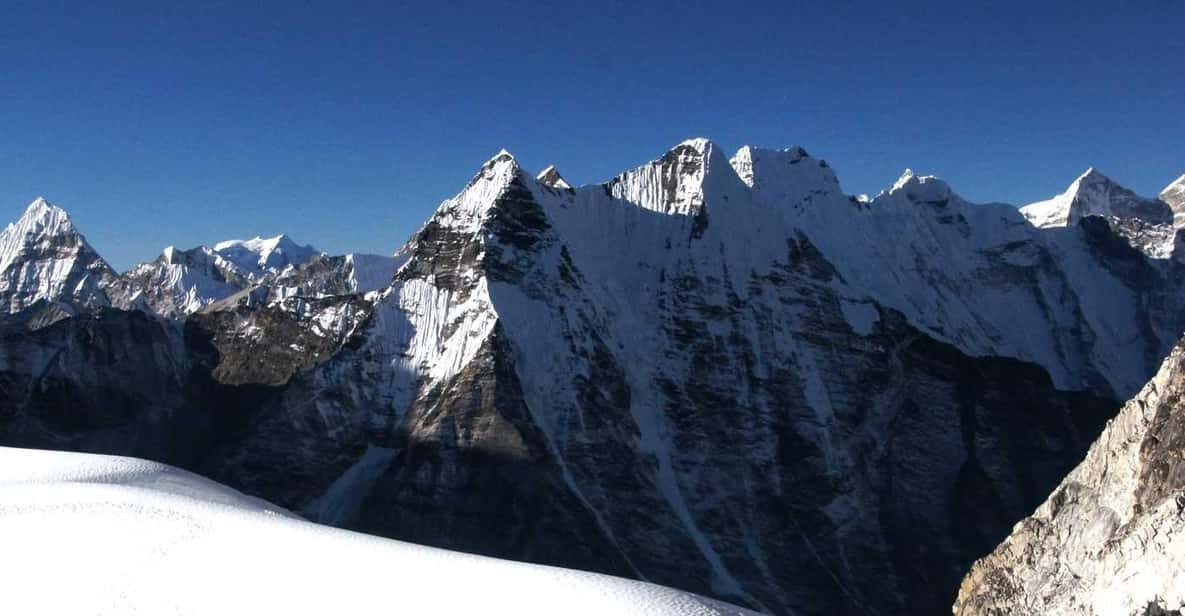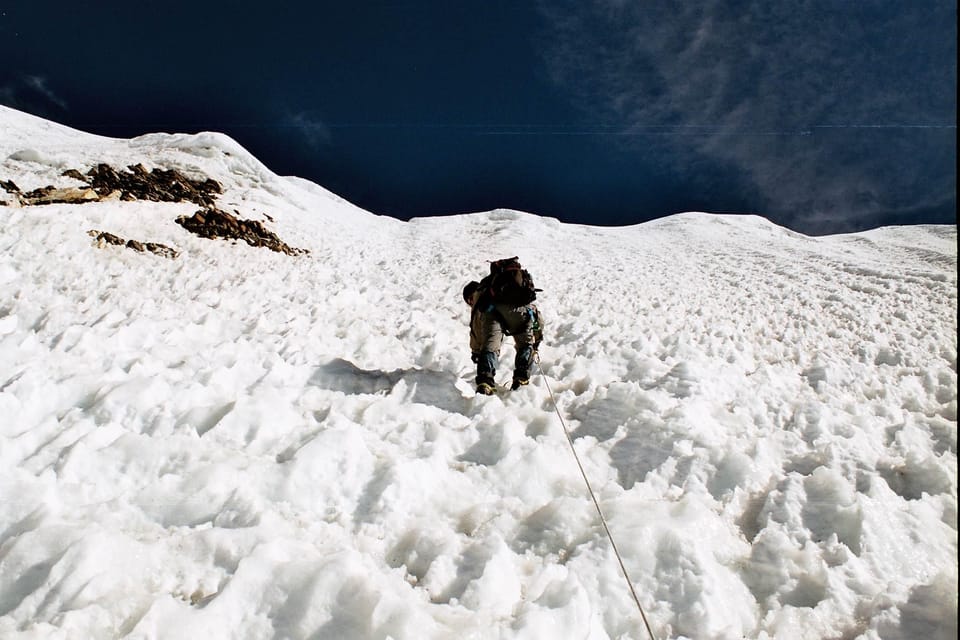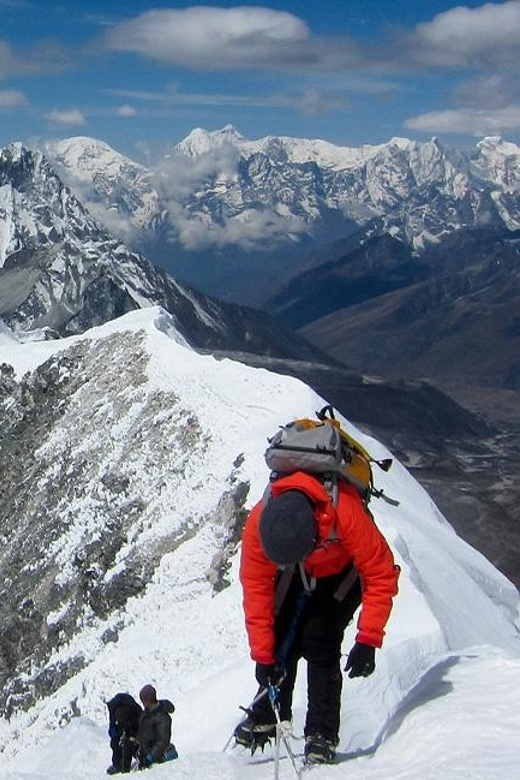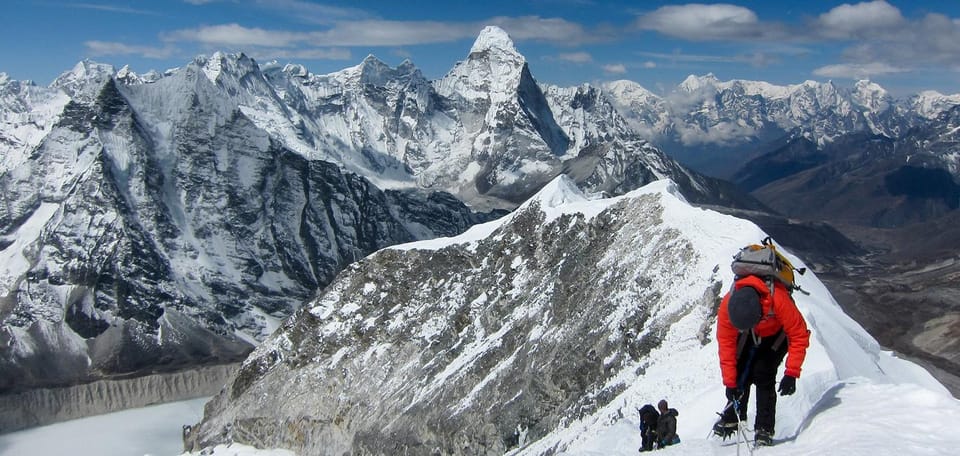When it comes to the Everest Base Camp Trek with Island Peak Climbing, there’s a unique blend of thrill and challenge awaiting adventurers. Imagine trekking through vibrant Sherpa villages, tasting local flavors, and soaking in jaw-dropping mountain views. It requires a decent level of fitness, so those who’ve got their cardio game on will feel right at home. Yet, the real kicker is the ascent of Island Peak, where the sense of accomplishment is unparalleled. But before anyone packs their bags, there are a few essential tips and insights that could make or break the experience. Curious about what they might be?
Key Points

- The trek includes a 21-day journey through stunning landscapes, culminating at Everest Base Camp and the Island Peak summit.
- Participants should have moderate physical fitness and prepare through cardio and strength training exercises for the trek’s challenges.
- The itinerary features culture with daily interactions with locals and opportunities to sample traditional dishes.
- Essential inclusions are airport transfers, cozy hotel stays, teahouse lodging, guides, porters, and necessary climbing gear.
- Comprehensive travel insurance is recommended to cover altitude sickness, injuries, and ensure safety during the adventure.
It's also worth checking out some other tours and experiences nearby.
Overview of the Trek

The Everest Base Camp Trek, combined with the thrilling ascent of Island Peak, promises adventurers an unforgettable 21-day journey through breathtaking landscapes and rich local culture.
Travelers get to experience the stunning views of towering snow-capped mountains while trekking through charming Sherpa villages. With prices starting around $3,632.82 per person, it’s a solid investment for an epic experience.
Along the way, trekkers can enjoy the local culture, sampling traditional dishes and interacting with friendly locals. This trek isn’t just about the destination; it’s about the journey, filled with challenges and triumphs.
With proper preparation and a moderate physical fitness level, adventurers will find their efforts rewarded with memories that last a lifetime.
Detailed Itinerary

Get set for an action-packed 21 days as trekkers navigate through a carefully crafted itinerary that takes them from the bustling streets of Kathmandu to the majestic heights of Everest Base Camp and Island Peak. Each day brings new adventures, stunning views, and cultural encounters. Here’s a sneak peek at the highlights:
-
Arrival & Sightseeing: Kick things off in Kathmandu with vibrant culture and stunning temples.
-
Epic Trekking: Hike through picturesque villages and breathtaking landscapes, culminating in the iconic Everest Base Camp.
-
Climb Island Peak: Conquer Island Peak for panoramic views that’ll leave you speechless.
This itinerary promises unforgettable moments, so lace up those hiking boots and get ready to explore!
Inclusions and Accommodations

Inclusions and accommodations make the Everest Base Camp Trek not just a challenging adventure but also a comfortable one, ensuring trekkers have everything they need along the way.
With airport pickups in a private vehicle, trekkers start their journey smoothly. They’ll enjoy cozy 3-star hotel stays in Kathmandu, complete with breakfast, before heading into the mountains for teahouse lodging.
During the climb, quality tents and kitchen utensils keep the camping experience hassle-free. All meals are covered, including welcome and farewell dinners that bring everyone together.
Plus, English-speaking guides, porters, and necessary permits are all part of the package, so trekkers can focus on soaking in the breathtaking views without worrying about the logistics.
It’s all about adventure with ease!
Physical Fitness Requirements
Preparing for the Everest Base Camp Trek means understanding that a moderate level of physical fitness is key to enjoying the adventure and tackling the challenges ahead.
It’s not just about reaching the summit; it’s about soaking in the breathtaking views and making every step count.
To get ready, here are three practical tips:
-
Cardio Training: Focus on activities like jogging, cycling, or swimming to build endurance.
-
Strength Training: Work on your legs and core with squats, lunges, and planks to handle steep trails.
-
Hiking Practice: Spend weekends hiking in your local hills to simulate the trek’s conditions.
Weather Considerations
Weather on the Everest Base Camp Trek can be unpredictable, so trekkers should be ready for anything Mother Nature throws their way. One moment, they might bask in the sun, and the next, face snow flurries.
It’s essential to check forecasts regularly and stay flexible with plans. Early mornings often bring clear skies, perfect for those iconic mountain views, but afternoons can turn cloudy.
Trekkers should pack layers, as temperatures can swing dramatically from warm days to chilly nights. Rain is common during monsoon season, so waterproof gear is a must.
Most importantly, staying alert to changes in weather can make or break the trekking experience—after all, you want to enjoy the stunning scenery without getting caught in a storm!
Essential Packing List
Packing for the Everest Base Camp Trek is all about being ready for whatever surprises the weather might throw at them, so they’ll want to make sure their gear is up to the challenge.
To keep things simple, here’s a quick packing list:
-
Warm Clothing: Insulated jackets and thermal layers are a must.
-
Hiking Gear: Sturdy hiking boots and a quality daypack will make all the difference.
-
Climbing Essentials: Don’t forget your climbing gear, sleeping bag, and a good pair of gloves.
With the right gear in tow, trekkers can focus on soaking in the breathtaking views and enjoying the adventure, rather than worrying about being underprepared.
Travel Insurance and Visa
Before setting off on the thrilling Everest Base Camp Trek, travelers should secure comprehensive travel insurance to cover any unexpected mishaps along the way.
It’s not just about lost luggage; altitude sickness and trekking injuries can happen, and having that safety net makes all the difference. Most companies offer plans specifically tailored for adventure travel, so it’s worth shopping around.
As for visas, visitors need to arrange their Nepalese visa beforehand or grab one on arrival at Tribhuvan International Airport.
It’s a straightforward process, but having your paperwork sorted before the trek helps avoid any last-minute hassles.
Responsible Trekking Practices
Having the right travel insurance and visa is just the start; responsible trekking practices are key to ensuring that the beauty of the Everest region is preserved for future adventurers.
Trekking through this stunning landscape comes with a responsibility to protect it, and here are three essential practices to keep in mind:
-
Leave No Trace: Pack out everything you bring in, including snacks and wrappers. Respect the environment!
-
Respect Local Culture: Engage with locals respectfully and learn about their customs. It’s a beautiful way to enrich your experience.
-
Support Eco-Friendly Initiatives: Choose companies that prioritize sustainable practices, like using biodegradable products and minimizing waste.
Here's a few more nearby tours and experiences we think you'll like.
Frequently Asked Questions
What Is the Best Time to Trek to Everest Base Camp?
For a great trek, he recommends spring (March to May) or autumn (September to November). During these months, the weather’s milder, views are stunning, and the trails aren’t overcrowded, making the experience even better.
How Do I Prepare for Altitude Sickness During the Trek?
To prepare for altitude sickness, she drinks plenty of water, snacks on high-carb foods, and takes it slow. Acclimatization days help her adjust, and she knows to listen to her body throughout the trek.
Are There Any Age Restrictions for This Trek?
They don’t impose strict age restrictions, but participants typically range from young adults to seniors. It’s essential for everyone to maintain good fitness levels and be prepared for the trek’s challenges, regardless of age.
Can I Hire Extra Porters for My Personal Belongings?
Sure, they can hire extra porters for personal belongings. It’s a practical move, especially for those wanting to lighten their load or carry extra gear. Porters make the trek much more comfortable and enjoyable!
What Communication Facilities Are Available During the Trek?
During the trek, he finds limited communication facilities. Wi-Fi’s spotty in teahouses, and mobile signals can be weak. He recommends bringing a power bank for devices and enjoying the moment instead of stressing about connectivity.
Not for you? Here's more of our most recent tour reviews happening neaby
- From Kathmandu: Unspoiled Wilderness Trek(Lower Dolpo Trek)
- Everest Base Camp Trek by Helicopter Return -11 Days
- Everest Base Camp: Private Helicopter Tour – 1 Day
- Kailash Mansarovar Yatra (15N/16D)
- Nepal: Sherpani Col Trek
- Nepal: Kanchenjunga Circuit Trek via Sele La Pass (4,480m)
- Nepal: Dhaulagiri Circuit 18-DAY Guided Trek (5,360 Meters)
- Ganja-la Chuli (Naya Kanga) Peak Climbing
- Mt Bokta Peak Climbing
- Private Lukla Village Tour From Kathmandu
- Kailash Mansarovar Yatra Tour From Nepal
- Everest Base Camp Helicopter Trek – 11 Days
- Ramdung Peak Climbing
- EVEREST HIGH PASS TREK
- Nepal Tibet Bhutan Tour
Recap
In the end, the Everest Base Camp Trek with Island Peak Climbing isn’t just a journey; it’s an adventure of a lifetime.
With stunning views, vibrant culture, and the thrill of reaching new heights, every step is worth it.
So lace up those hiking boots, prepare your gear, and get ready to make some unforgettable memories.
Whether you’re soaking in the views or sharing stories with fellow trekkers, this trek will leave you with experiences you’ll cherish forever.
